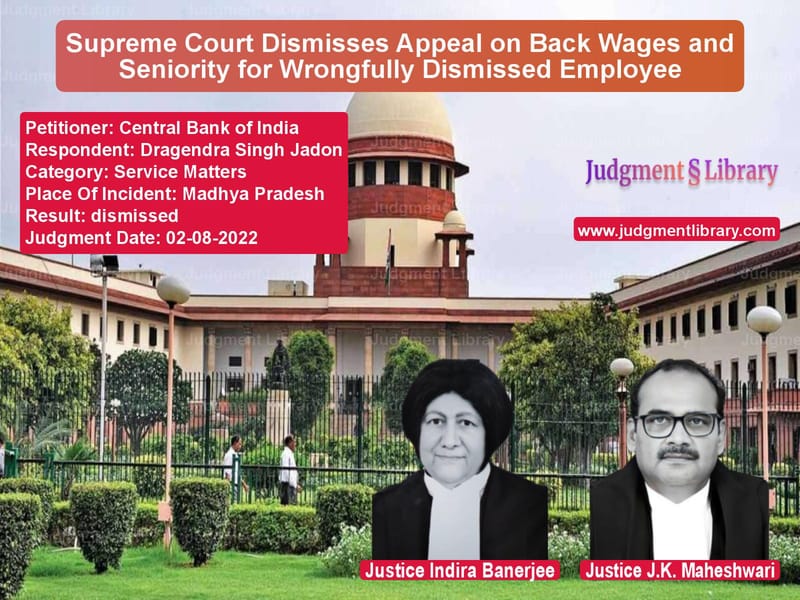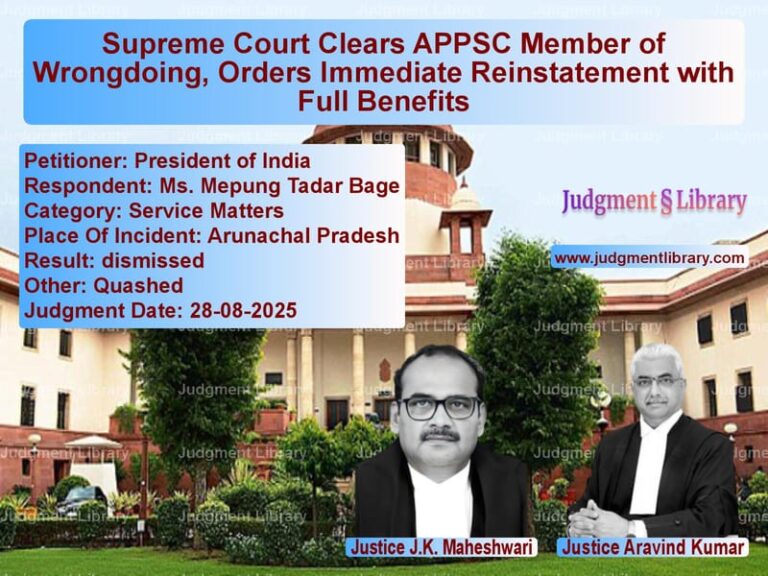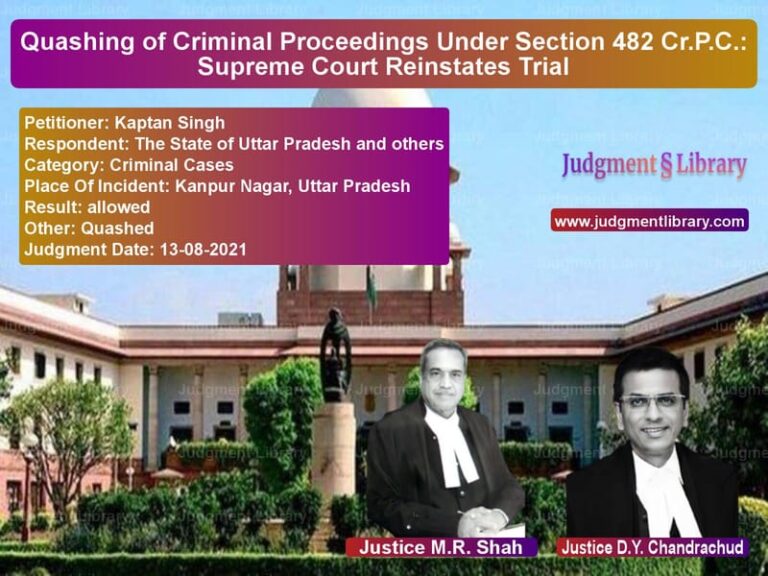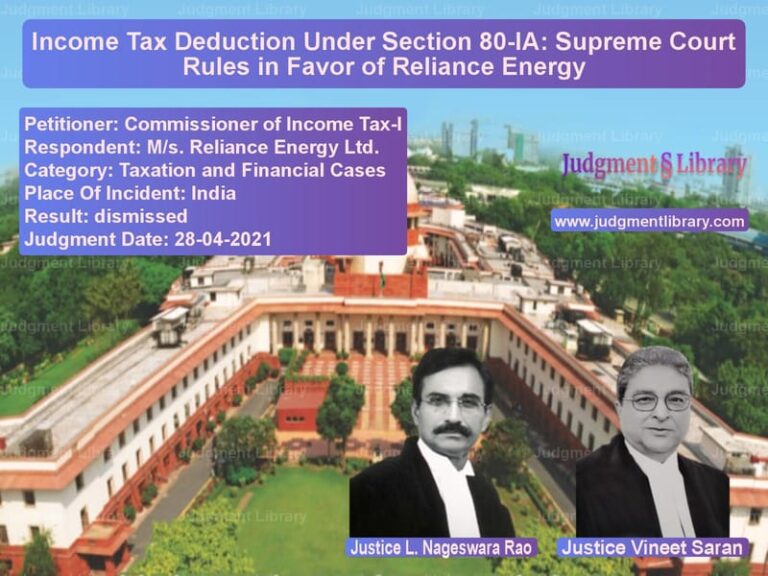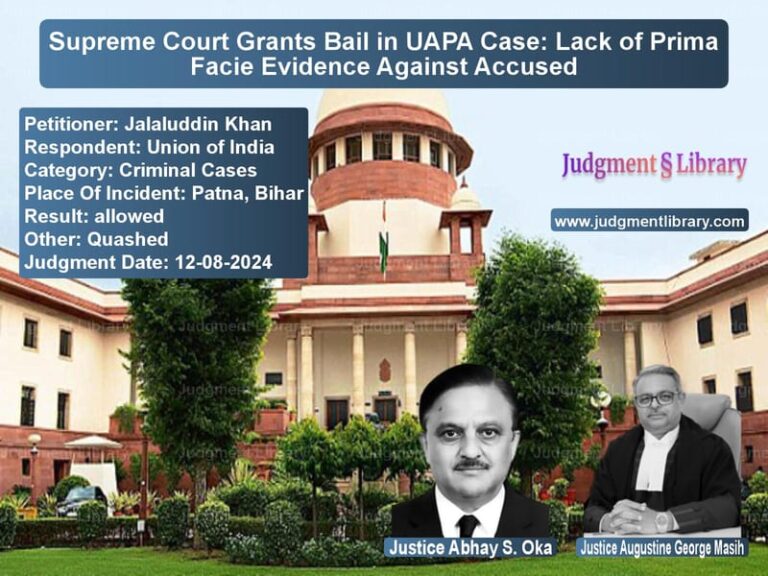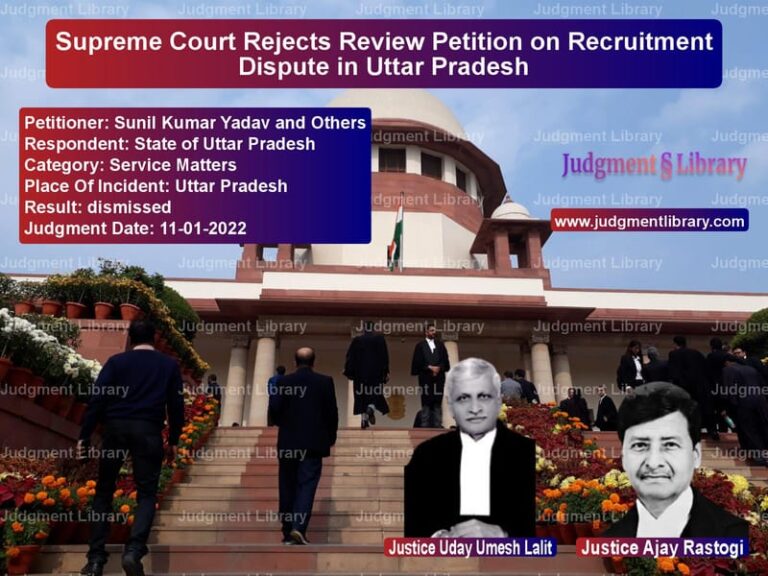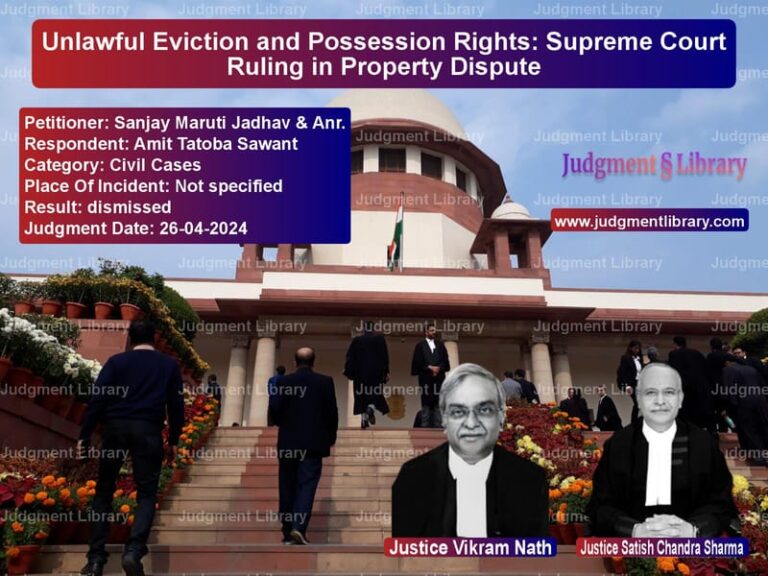Supreme Court Dismisses Appeal on Back Wages and Seniority for Wrongfully Dismissed Employee
The Supreme Court of India, in Central Bank of India v. Dragendra Singh Jadon, addressed the issue of reinstatement and entitlement to seniority and promotion for an employee whose dismissal was deemed wrongful. The case stemmed from the respondent, Dragendra Singh Jadon, being dismissed from service in 1982 for alleged impersonation during a recruitment test. The legal battle involved the correctness of his dismissal, the denial of back wages, and the entitlement to service benefits after reinstatement.
Background of the Case
On April 23, 1975, the respondent was appointed as an Agricultural Assistant at the Kailaras Branch of the Central Bank of India. In 1979, the respondent was charged with impersonating his brother in a written test held by the Banking Service Recruitment Board in Lucknow. A disciplinary inquiry was conducted, and the respondent’s services were terminated in January 1982.
The respondent raised an industrial dispute, and in 1988, the dispute was referred to the Industrial Tribunal. In 2008, the Tribunal ruled that the respondent’s dismissal was unjustified and directed his reinstatement without back wages. However, the Tribunal allowed the respondent to be reinstated with notional pay fixation but denied back wages on the grounds that the respondent had been gainfully employed during the period between his dismissal and reinstatement.
In 2009, the respondent filed a writ petition seeking back wages, seniority, and other service benefits, including promotion. The petition was filed against the Central Bank of India’s failure to implement the Tribunal’s award appropriately, particularly the denial of back wages and service benefits. The Single Bench of the Madhya Pradesh High Court ruled in favor of the respondent, and this decision was later upheld by the Division Bench of the High Court in 2012. The respondent continued to press for additional benefits, including pay fixation and seniority as part of his reinstatement.
Petitioner’s (Central Bank of India) Arguments
The petitioner, represented by senior counsel, presented the following key arguments:
- The High Court erred in not considering the principle of res judicata. The issue of back wages had already been decided in the earlier writ petition, and it could not be re-agitated in the present petition.
- The respondent had not actually served the bank between 1982 and 2012 and, therefore, was not entitled to seniority, promotion, or back wages for this period.
- The decision of the Tribunal was complied with in good faith, and the bank had already reinstated the respondent in 2012, as per the court’s order.
- The denial of back wages was justified because the respondent had been employed elsewhere during his period of termination.
Respondent’s Arguments
The respondent, Dragendra Singh Jadon, argued the following points:
- The respondent was wrongfully dismissed, and the Tribunal had already ruled that his dismissal was unjustified. The bank’s failure to implement the Tribunal’s order in full was a violation of his legal rights.
- Seniority and promotion should be granted because, by law, reinstatement means a restoration to the original position, including benefits like seniority and promotion.
- The denial of back wages was not justified, as he had no control over his wrongful dismissal and had earned a living in the interim period.
- The bank cannot benefit from its own wrong by denying service benefits and promotion rights.
Supreme Court’s Key Observations
The Supreme Court analyzed the case from a legal and constitutional perspective. The key observations made by the Court included:
- Res Judicata: The Court noted that the principle of res judicata did not apply in this case as the causes of action were different in the second petition. The first writ petition dealt with the legality of the dismissal, while the second petition focused on seniority, service benefits, and pay fixation after reinstatement.
- Reinstatement and Seniority: The Court emphasized that reinstatement must restore the employee to their original position, including entitlements to seniority, promotions, and service benefits, except in exceptional cases where the employee had not worked during the intervening period.
- Back Wages: The Court agreed with the Tribunal’s finding that the respondent should not be entitled to back wages due to his gainful employment during the period between his dismissal and reinstatement. The principle of “no work, no pay” was upheld, but the denial of seniority and promotion rights was not justified.
- Bank’s Responsibility: The Court ruled that the bank should not take advantage of its own wrong and must compensate the respondent for the length of service lost due to the wrongful termination.
Supreme Court’s Judgment
The Supreme Court delivered the following judgment:
- The appeal filed by the Central Bank of India was dismissed.
- The Court upheld the decision of the High Court, ruling that the respondent was entitled to seniority and promotion benefits from the date of his removal to the date of his reinstatement.
- The denial of back wages was upheld, as the respondent had been gainfully employed during the period of termination.
- The bank was directed to fix the respondent’s pay and seniority as per the Tribunal’s award and to consider him for promotion from the date of reinstatement.
Impact of the Judgment
This judgment has significant implications for employment law and the rights of employees wrongfully dismissed. Key impacts include:
- Legal Precedent for Reinstatement: The ruling reinforces the principle that reinstatement restores an employee to their full rights, including seniority and promotion, even if back wages are not awarded.
- Employer Accountability: The decision places responsibility on employers to implement Tribunal awards and provide all due benefits to employees who are wrongfully dismissed.
- Fair Compensation for Wrongful Dismissal: The judgment emphasizes the importance of compensating employees for lost service benefits, including seniority, even in cases where back wages are not applicable.
- Clarification on Service Continuity: The case provides clarity on how service continuity should be treated in cases of wrongful dismissal, even when back wages are denied.
Conclusion
The Supreme Court’s decision in Central Bank of India v. Dragendra Singh Jadon highlights the importance of fair treatment for employees who are wrongfully dismissed. By upholding the entitlement of reinstated employees to seniority and promotion benefits, the Court reinforced the principle that reinstatement restores employees to their original position. The ruling sets a precedent for future cases involving wrongful dismissal and the enforcement of Tribunal awards for reinstatement, offering a comprehensive framework for understanding employee rights in such situations.
Petitioner Name: Central Bank of India.Respondent Name: Dragendra Singh Jadon.Judgment By: Justice Indira Banerjee, Justice J.K. Maheshwari.Place Of Incident: Madhya Pradesh.Judgment Date: 02-08-2022.
Don’t miss out on the full details! Download the complete judgment in PDF format below and gain valuable insights instantly!
Download Judgment: central-bank-of-indi-vs-dragendra-singh-jado-supreme-court-of-india-judgment-dated-02-08-2022.pdf
Directly Download Judgment: Directly download this Judgment
See all petitions in Employment Disputes
See all petitions in Workplace Harassment
See all petitions in Termination Cases
See all petitions in Judgment by Indira Banerjee
See all petitions in Judgment by J.K. Maheshwari
See all petitions in dismissed
See all petitions in supreme court of India judgments August 2022
See all petitions in 2022 judgments
See all posts in Service Matters Category
See all allowed petitions in Service Matters Category
See all Dismissed petitions in Service Matters Category
See all partially allowed petitions in Service Matters Category

